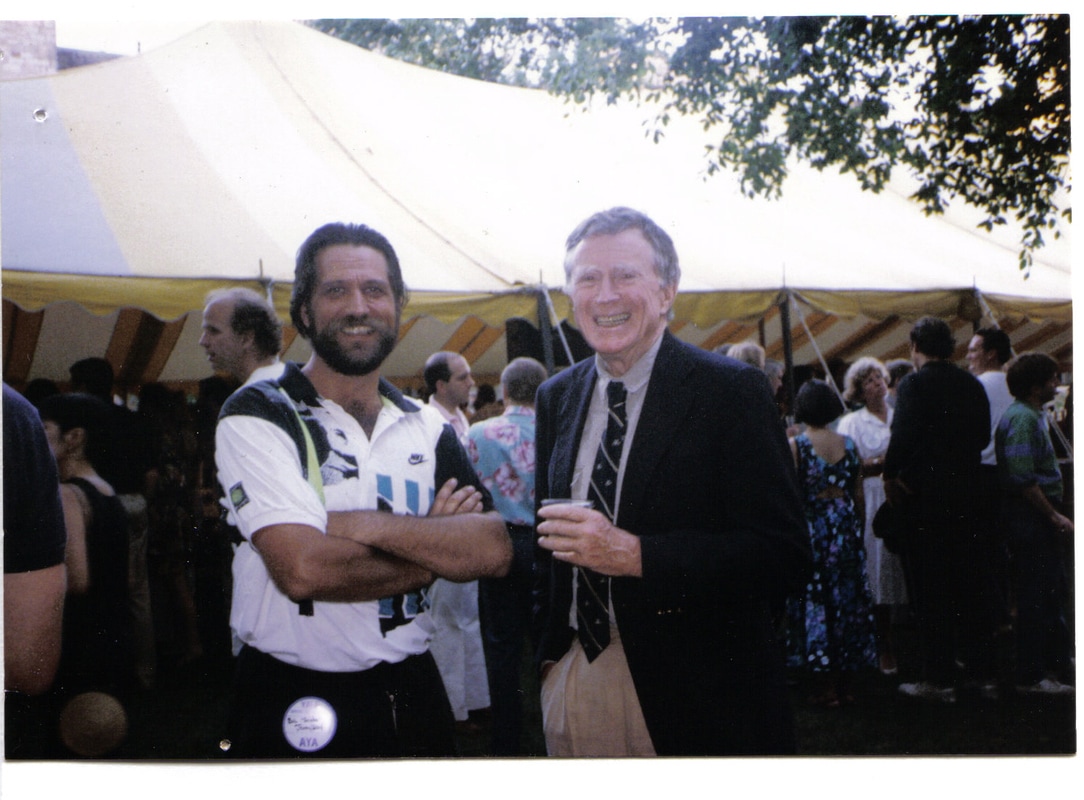|
The Little Things In the past I have written about teaching, often discussing it as a misunderstood profession --- or one that is taken for granted by too many people. The old adage, “those who can, do; those who can’t, teach” has dogged the profession forever and I’d argue that while it may be true for some, that adage is incorrect and unfair. More than that, I have spent years asking people (anyone who would listen, the “hostages” in workshops I facilitated, etc) to “name a teacher who had an impact on your life.” Almost everyone can do that and, if you consider that, it’s quite remarkable. I’d also point out that all of our “professionals” (doctors, lawyers, architects, etc.) are where they are because of teachers! So, I won’t belabor the point: when we do a case-by-case study, teachers make a difference. I bring this up because I had a wonderful experience yesterday. One of my former high school students --- a very successful professional --- sent me an email asking for a good time to call. He is being considered for a position --- a kind of “lateral” move --- that was related, a bit, to teaching --- and he just wanted “to ask some questions” and talk about the process he was going through. When I say this is a successful professional, I’m talking about a man in his mid-50’s who has done outstanding work in his field and been publicly recognized for it. It’s hard to convey how heartwarming it is to have a former student, someone you worked with when he was in 7th grade and 11th grade, respect your opinion enough to “give a call.” It was an interesting and stimulating conversation and I hope I was able to dispense some useful advice. But what I’m writing about here is teachers --- and how “the little things” about the job can be satisfying beyond description. Teaching, if you try to do it well, is an extremely difficult job requiring long hours and enormous physical stamina. There were very few people I worked with over my 42 years in the profession (in many settings up and down the Northeast corridor) who were not dedicated and hard working. Were they all scintillating and inspirational? Of course not. But I’d challenge any profession to claim all their practitioners are exceptional. We don’t live in Lake Wobegon. Getting back to the nuts and bolts and the little rewards, let me try to provide some insight for those who have not been part of the profession (or who haven’t had a parent, spouse, sibling in the teaching profession). For all those who like to point out how much” time off” teachers get, think about this. My weekdays started at 5 a.m. On the way to work, whether driving, walking, or taking public transportation, one’s mind is on the day ahead. You’re thinking not only about what you’re teaching (and it’s usually several classes each day if you’re a high school teacher) but also about what physical environment you’re going to use in your classroom and, most important, who you’ll be teaching (what grade level, who was absent yesterday and needs to be “caught up,” who had a good/bad day yesterday, who owes work, etc.). Once the first bell rings, it’s like the start of a race and you spend almost all the rest of the day on your feet, running your laps. That entails working with 20 to 30 adolescents at a time in 50-minute bursts, five times before the final bell rings. The dynamics and energy of those 6 to 7 hours is impossible to describe. You have to do it, not just imagine it, to fully appreciate what an impossible task it is --- but what a gratifying task it can be. The day is comprised of hundreds of individual interactions! Hundreds! You are required to be a conductor, a coach, a dictator, a stand-up comedian, a storyteller, a sage, and, yes, a role model. And, trust me, good teachers may not be aware of those roles in the moment but, deep in their consciousness, it’s all there. Again, it’s exhilarating but it’s also exhausting. And that’s just the school day. Any good teacher takes work home. Every night. If you want to argue that I “only” work 185 days a year I’ll counter by saying I also work 185 nights. Planning, reading and responding to student work, thinking about other teachers or parents or administrators you need to talk to tomorrow --- all that is part of your evening’s work. I didn’t have to deal with a family in my years as a teacher and, quite honestly, I don’t know how people do it. (My brother, my close friends, and my wife --- all raised kids and taught! And were great teachers! --- an incredible feat from my perspective). The idea of having a “social life” on weeknights is pretty much out of the question for many teachers. The weekends aren’t much better. When I was preparing teachers at Brown and Yale --- and these were incredible young people; bright, dedicated, hard working --- I would emphasize to them that they needed to designate one of the weekend days as “their own day.” That is, NO school oriented work at all for one of the weekend days. I would issue this edict to these young professionals because I knew, from experience, teachers (particularly early in their careers) can be consumed by their work for an entire weekend. Nationally, we lose almost 40% of new teachers within five years of their starting the profession, an incredible attrition rate. It’s not because they are not capable, it’s because the job is grueling, and societal respect as well as economic compensation are minimal. People see they can make more money doing less debilitating work --- so they leave the teaching profession. There is an element of teaching that makes it a “calling” for those who remain. It requires commitment and a sense that one is “giving something back” to society. I’ve often likened it to the role the clergy played in earlier (western) societies. Why do we do it? Interviewing candidates for the Teacher Prep programs I worked in I would always ask candidates to tell my why they wanted to be teachers “and don’t tell me it’s because you like kids.” That’s the given and that’s the payoff. It’s the “given” because if you’re not going into teaching because you like kids --- if you’re doing it for the time off or because it matches your kid’s hours and vacations --- then you shouldn’t be doing it. The big payoff in teaching is the kids, period. The daily interaction, the growing relationships over the course of the school year, the continued connection (if you’re lucky) beyond graduation are pretty indescribable. So, getting an email or phone call from someone who graduated from high school in 1979, or 1989, or 2014, is a special moment for a teacher --- even if (s)he’s been retired for a few years. You never lose your dedication to your “kids,” as well as your hope for their success and good fortune. Social media has made all this easier now, of course, and that’s a benefit we never anticipated way back when we were still listening to LP’s and watching broadcast television. It’s great to be able to connect and today’s phone call was icing on the cake! My hope would be that anyone reading this who remembers a teacher fondly for his/her kindness, inspiration, or dedication send an email, or a text, or leave a message, noting the contribution they made to your development --- you have no idea how much that means to a teacher. It’s the little things. That’s why they do the job.
0 Comments
Leave a Reply. |
|
- Home
- The Blast -Blog
- The Blast (Archive)
- Blast Directory (Archive)
- California Streamin'
- Politics
- Culture
- ART
- SONGS
- Reviews
- Op-Ed Material
- New Writing
- Old Writing
- ARCHIVES
- "If you went to Yale . . ."
- Outing the Privilege Gap
- Thoughts on TFA
- Sir Ken Robinson: Education & Creativity
- My 91 seconds of Rock-music-video Fame!
- Creating Democratic Schools
- Acknowledgments
- About the Author
- Contact Info
Proudly powered by Weebly


